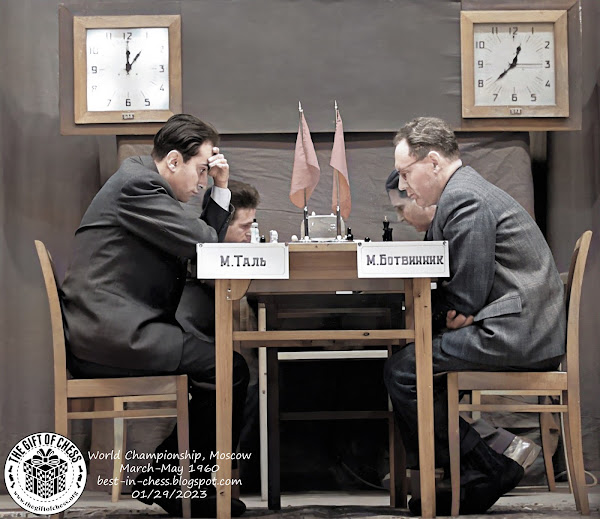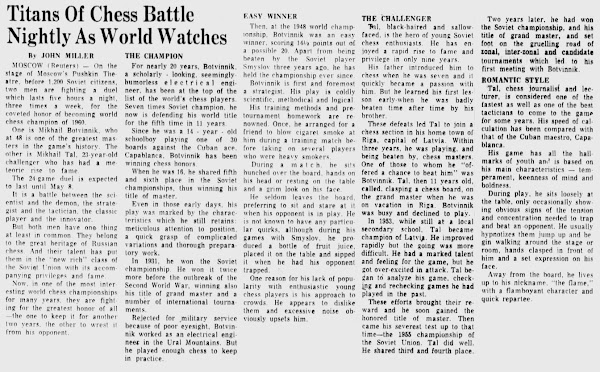March 1960
April 30 1960
The Sun Times, Owen Sound, Ontario, Canada, Saturday, April 30, 1960
Titans Of Chess Battle Nightly As World Watches
By John Miller
MOSCOW (Reuters)-On the stage
On the stage of Moscow's Pushkin Theatre before 1200 Soviet citizens two men are fighting a duel which lasts five hours a night three times a week for the coveted honor of becoming world chess champion of 1960.
One is Mikhail Botvinnik who at 48 is one of the greatest masters in the game's history. The other is Mikhail Tal, 23-year-old challenger who has had a meteoric rise to fame.
The 24-game duel is expected to last until May 8.
It is a battle between the scientist and the demon, the strategist and the tactician, the classic player and the innovator.
But both men have one thing at least in common. They belong to the great heritage of Russian chess. And their talent has put them in the “new rich” class of the Soviet Union with its accompanying privileges and fame.
Now, in one of the most interesting world chess championships for many years, they are fighting for the greatest honor of all—the one to keep it for another two years, the other to wrest it from his opponent.
THE CHAMPION
For nearly 20 years, Botvinnik, a scholarly-looking, seemingly-humorless electrical engineer, has been at the top of the list of the world's chess players. Seven times Soviet champion, he now is defending his world title for the fifth time in 11 years.
Since he was 14-year-old schoolboy playing one of 30 boards against the Cuban ace, Capablanca, Botvinnik has been winning chess honors.
When he was 16, he shared fifth and sixth place in the Soviet championships, thus winning his title of master.
Even in those early days, his play was marked by the characteristics which he still retains, meticulous attention to position, a quick grasp of complicated variations and thorough preparatory work.
In 1931, he won the Soviet championship. He won it twice more before the outbreak of the second World War, winning also his title of grand master and a number of international tournaments.
Rejected for military service because of poor eyesight, Botvinnik worked as an electrical engineer in the Ural Mountains. But he played enough chess to keep in practice.
EASY WINNER
Then, at the 1948 world championship, Botvinnik was an easy winner, scoring 14½ points out of a possible 20. Apart from being beaten by the Soviet player Smyslov three years ago, he has held the championship ever since.
Botvinnik is first and foremost a strategist. His play is coldly scientific, methodical and logical.
His training methods are pre-tournament homework are renowned. Once, he arranged for a friend to blow cigarette smoke at him during a training match before taking on several players who were heavy smokers.
During a match, he sits hunched over the board, hands on his head or resting on the table and a grim look on his face.
He seldom leaves the board, preferring to sit and stare at it when his opponent is in play. He is not known to have any particular quirks, although during his games with Smyslov, he produced a bottle of fruit juice, placed it on the table and sipped it when he had his opponent trapped.
One reason for his lack of popularity with enthusiastic young chess players is his approach to crowds. He appears to dislike them and excessive noise obviously upsets him.
THE CHALLENGER
Tal, black-haired and sallow-faced, is the hero of young Soviet chess enthusiasts. He has enjoyed a rapid rise to fame and privilege in only nine years.
His father introduced him to chess when he was seven and it quickly became a passion with him. But he learned his first lesson early when he was badly beaten time after time by his brother.
These defeats led Tal to join a chess section in his home town of Riga, capital of Latvia. Within three years, he was playing, and being beaten by, chess masters. One of those to whom he “offered a chance to beat him” was Botvinnik. Tal, then 11 years old, called, clasping a chess board, on the grand master when he was on vacation in Riga. Botvinnik was busy and declined to play.
In 1953, while still at a local secondary school, Tal became champion of Latvia. He improved rapidly but the going was more difficult. He had a marked talent and feeling for the game, but he got over-excited in attack. Tal began to analyze his game, checking and rechecking games he had played in the past.
These efforts brought their reward and he soon gained the honored title of master. Then came his severest test up to that time—the 1955 championship of the Soviet Union. Tal did well. He shared third and fourth place.
Two years later, he had won the Soviet championship, and his title of grand master, and set foot on the grueling road of zonal, inter-zonal and candidate tournaments which led to his first meeting with Botvinnik.
ROMANTIC STYLE
Tal, chess journalist and lecturer, is considered one of the fastest as well as one of the best tacticians to come to the game for some years. His speed of calculation has been compared with that of the Cuban maestro, Capablanca.
His game has all the hallmarks of youth and is based on his main characteristics—temperament, keenness of mind and boldness.
During play, he sits loosely at the table, only occasionally showing obvious signs of the tension and concentration needed to trap and beat an opponent. He usually hypnotizes them jump up and begin walking around the stage or room, hands clasped in front of him and a set expression on his face.
Away from the board, he lives up to his nickname, “the flame,” with a flamboyant character and quick repartee.
























